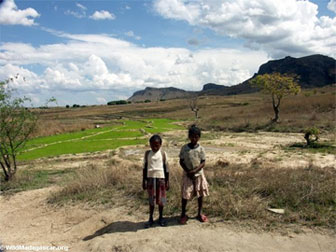G8 aid for Africa under threat from climate change
News release from the Royal Society
November 21, 2005
An increase in aid for Africa agreed at the Gleneagles summit may be entirely consumed by the cost of dealing with climate change, the President of the Royal Society, the UK national academy of science, has warned Margaret Beckett and other G8 energy and environment ministers in an open letter published ahead of their key climate change meeting in London on 1 November.
The letter from Lord May of Oxford urges the G8 ministers to recognise the impacts of increasing drought conditions in Ethiopia and more severe hurricanes in the United States that may already be occurring due to climate change, and to agree further action to combat greenhouse gas emissions. The meeting is the first to be held since G8 leaders agreed at Gleneagles to establish a “dialogue” on climate change, and is due to be addressed by the Prime Minister, Tony Blair, and the head of the World Bank, Paul Wolfowitz.
The letter also calls for the G8 to back an international study into the level at which greenhouse gases should be stabilised in the atmosphere to avoid dangerous climate change. It suggests that the action plan agreed at the Gleneagles summit in July “fell far short of a strategy to stop the rise in greenhouse gas levels in the atmosphere”.
Lord May’s letter states: “As long as greenhouse gas concentrations continue to rise, there is the very real prospect that the increase in aid agreed at Gleneagles will be entirely consumed by the mounting cost of dealing with the added burden of adverse effects of climate change in Africa. In effect, the Gleneagles communiqué gave hope to Africa with one hand, through a promise of more aid, but took that hope away with the other hand through its failure to address adequately the threat of climate change.” It adds: “Therefore, if the increase in aid and other measures outlined in the Gleneagles action plan on Africa are to create maximum benefit, they must be accompanied by effective action on climate change by stopping the inexorable rise of greenhouse gas levels in the atmosphere.”
 Related articles Developing countries to suffer worst global warming impacts November 18, 2005 In a recent chilling assessment, the World Health Organization (WHO) reported that human-induced changes in the Earth’s climate now lead to at least 5 million cases of illness and more than 150,000 deaths every year. Africa Heats Up — climate change threatens future of the continent October 11, 2005 |
The letter draws attention to a collection of 17 scientific papers, also published today, which examine the impact of climate change on crops. It highlights a paper that concludes that rising sea surface temperatures in the Indian Ocean are responsible for a drop in rainfall in Ethiopia since 1996.
Lord May’s letter also warns of the impact that climate change may already be having on richer countries, such as the United States. It states “Although it is not possible to say that the destructive potentials of hurricanes Katrina, Rita and Wilma were greater because of global warming, a connection is likely and certainly cannot be ruled out.” The letter points out that the $200 billion estimated cost of dealing with the impacts of Hurricane Katrina is equivalent to 1.7% of the gross domestic product of the United States, compared to estimates that it would cost no more than 1% of GDP for the country to meet its target under the Kyoto Protocol. It concludes: “Clearly dealing with even some of the consequences of climate change, such as more destructive hurricanes, looks more costly than taking measures to reduce greenhouse gas emissions.”
This is a modified press release from The Royal Society. The original version appears at G8 aid for Africa under threat from climate change, warns Lord May